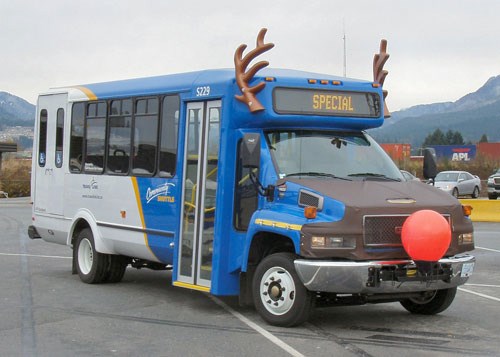Anyone hoping to catch a bus in some parts of the Tri-Cities in the next six months should get ready to wait, according to a bus union official.
Service disruptions are expected to continue in many neighbourhoods as TransLink works to replace 62 defective diesel community shuttles, vehicles that have been frequently taken off the road due to complaints about exhaust fumes making drivers sick.
Nathan Woods, president of Unifor Local 111, which represents Coast Mountain Bus Co. drivers, told Coquitlam councillors during a committee meeting Monday that from five to 10 drivers are regularly sidelined because coaches are unavailable.
“As much as we have been ramping up concerns about the fumes and the toxicity of it, the issues here are… service reliability,” he said during Monday’s council in committee meeting.
“Transit services have been severely impacted over the last 18 months as part of this ongoing issue.”
TransLink announced this week that it will spend $9.35 million to replace the shuttles with gas-powered vehicles but those won’t arrive until next spring.
In the meantime, Woods said maintaining regular service levels will be problematic unless other buses can be brought in. He added that there have been 126 exhaust exposures and 12 claims are currently before WorkSafeBC.
“You are going to have more service loss,” he told councillors. “You will see an impact. Every day there are three to four exposures that pop up on my email.”
The lack of communication from TransLink regarding the service disruption frustrated several councillors, who agreed to send a letter to the transit authority expressing their concerns.
Coun. Brent Asmundson, who is also a Coast Mountain bus driver, said the company has been aware of the exhaust problems with its shuttles for a long time and has done little to inform passengers.
“I think it is terrible that people are just left there,” he said. “If they knew, they could have adjusted to it.”
But Coast Mountain Bus Co.’s vice-president of operations, Mike Madill, said the service issues are not as bad as the union is saying. While there were some noticeable disruptions, particularly in the spring, the company has taken action, he told The Tri-City News in an interview. Vehicle retirements have been delayed and several buses that were taken out of commission have been brought back in order to fill the gaps in the schedule left by the community shuttles.
“We did have a spate where it was higher than normal,” he said yesterday. “It is now tapering back down.”
He also countered claims made by the union that between five and 10 drivers are left without a vehicle on a regular basis.
“I would disagree with that,” he said.
The $9.35 million to pay for the new buses will come from the federal gas tax fund after Metro Vancouver directors approved replacing the vehicles last Friday.
According to TransLink, the replacement shuttles are “urgently required due to growing concerns over the emission problems.”
While the shuttles are based out of Port Coquitlam, they are used primarily in the Tri-Cities, Maple Ridge, Burnaby and New Westminster.
The transportation authority said operators have been booking off sick because of large amounts of fumes, adding there have also been growing public complaints about excessive tailpipe smoke.
Gas-powered shuttles cost less than diesel models — about $140,000 instead of $250,000 — but they do not last as long, with a five-year lifespan instead of seven. Still, TransLink expects lower operating costs.
TransLink is still trying to fix the defective diesel shuttles and has not ruled out returning them to service, if possible.
– with reporting by Jeff Nagel



